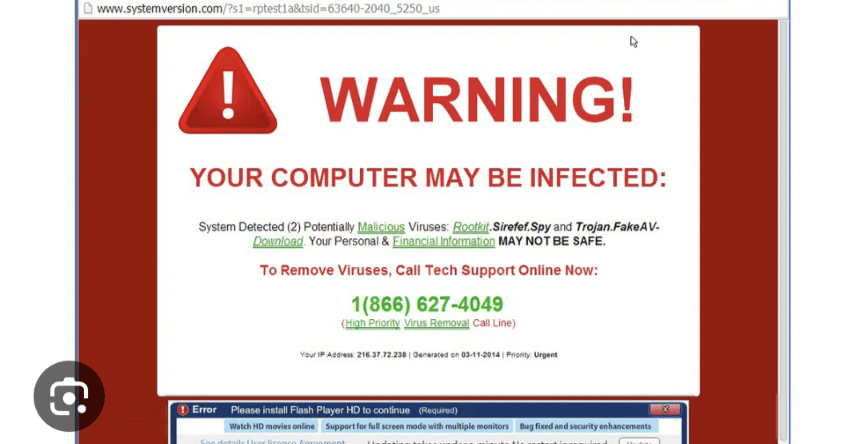
Supply Chain Attacks: A Weak Link in the Cybersecurity Chain?
October 27, 2023
How Backups Can Save Your Small Business from a Cybersecurity Disaster
October 29, 2023Tech support scams are a type of fraud in which scammers pose as legitimate technical support representatives to trick people into paying for unnecessary services or giving them access to their devices or personal information.
Tech support scams are becoming increasingly common and costly. According to the Federal Trade Commission (FTC), people reported losing over $1 billion to tech support scams in 2021.
How tech support scams work
Tech support scammers can use a variety of methods to contact their victims, including:
- Phone calls: Scammers may call people and claim to be from a well-known tech company, such as Microsoft or Apple. They may say that the person’s computer has been infected with a virus or malware, or that their software needs to be updated. The scammers will then offer to fix the problem for a fee.
- Pop-up messages: Scammers may also use pop-up messages that appear on people’s computer screens. The pop-up messages may warn the person that their computer is infected with a virus or malware, or that their software needs to be updated. The pop-up messages will then provide a phone number or link for the person to call or click on to get help.
- Emails: Scammers may also send emails to people claiming to be from a well-known tech company. The emails may warn the person that their account has been compromised or that their software needs to be updated. The emails will then provide a phone number or link for the person to call or click on to get help.
Once the scammer has gained access to the person’s device or personal information, they may steal their money, install malware on their device, or commit other types of fraud.
Types of tech support scams
There are a number of different types of tech support scams, including:
- Fake antivirus scams: Scammers may call people and claim that their computer is infected with a virus or malware. They will then offer to sell the person antivirus software to fix the problem. However, the antivirus software is often fake or malware itself.
- Fake tech support websites: Scammers may create fake websites that look like the websites of legitimate tech companies. People who visit these websites may be prompted to enter their personal information or download malware.
- Fake tech support apps: Scammers may create fake tech support apps that are available for download on app stores. People who download these apps may be prompted to enter their personal information or give the app permission to access their device.
How to protect yourself from tech support scams
There are a number of things you can do to protect yourself from tech support scams, including:
- Be suspicious of unsolicited calls, emails, and pop-up messages. If someone contacts you claiming to be from a tech company and you didn’t initiate the contact, be suspicious.
- Don’t give out your personal information or allow anyone to access your device remotely unless you’re sure they’re legitimate. If you’re unsure, contact the tech company directly.
- Keep your software up to date. Software updates often include security patches that can help protect your device from malware and other threats.
- Use a strong antivirus program and keep it up to date. An antivirus program can help protect your device from malware and other threats.
If you think you’ve been the victim of a tech support scam
If you think you’ve been the victim of a tech support scam, you should:
- Report it to the FTC. You can report tech support scams to the FTC online or by calling 1-877-382-4357.
- Report it to the Internet Crime Complaint Center (IC3). You can report tech support scams to the IC3 online.
- Change your passwords. Change the passwords for all of your online accounts, including your bank accounts, credit card accounts, and email accounts.
- Scan your device for malware. Use an antivirus program to scan your device for malware.
Tech support scams are a serious problem, but there are a number of things you can do to protect yourself. By being aware of the different types of tech support scams and taking steps to protect yourself, you can reduce your risk of becoming a victim.
#techsupportscams #fraud #cybersecurity #phishing #malware




